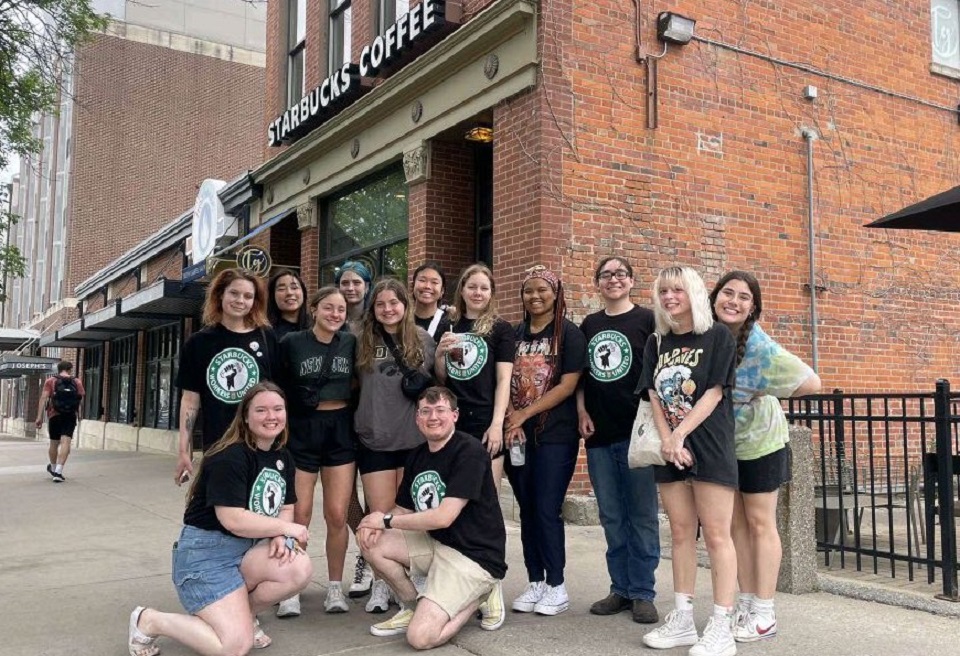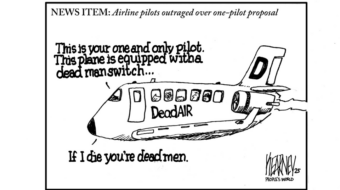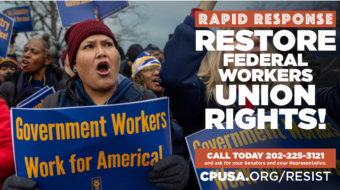
NEW YORK—Starbucks workers seeking to unionize the giant coffee chain have had a busy and hectic time, centered around a May Day march on its Manhattan headquarters to demand the firm sit down and bargain contracts with workers at unionized stores, as a group.
So did a National Labor Relations Board administrative law judge in Boston, Bloomberg News reported. The judge filed his overriding labor law-breaking decision on April 26, even before dozens of New York-New Jersey metro area Starbucks workers jammed the corporation’s lobby on May 1. They met silence from a stony-faced security guard.
“Instead of engaging in a conversation, corporate managers just stood there silently and did not accept the petition, which was signed by workers and local elected officials in solidarity,” Starbucks Workers United tweeted after posting video of the May Day standoff on its twitter feed. “Why is @Starbucks corporate so afraid of even speaking w/ workers, who it calls partners?”
“Starbucks CEO Laxman Narasimhan,” successor to founder and lead stockholder Howard Schultz, “is continuing Starbucks’ ruthless union-busting campaign that includes firing over 230 union leaders across the country and shuttering union stores. Starbucks continues to attempt to undercut the union by refusing to bargain.”
It uses “flimsy complaints such as the size of the bargaining committee,” the unionists said in a statement before a Chicago press conference, also on May Day.
The NLRB’s administrative law judge agreed. He declared Starbucks broke labor law by refusing to bargain with the workers at a minimum of 144 stores as a group, as the pro-union workers and SWU demand.
The judge’s ruling doesn’t count more NLRB charges filed against Starbucks at four Chicago stores, also on May Day. Most involved rampant labor law-breaking at the Hyde Park Starbucks, at East 55th St. and South Woodlawn Ave., across 55th from the University of Chicago.
Those counts include illegal discipline, illegal one-on-one meetings, and eventual illegal firing last year of Hyde Park pro-union worker Jasper Booth-Hodges, NLRB Administrative Law Judge Geoffrey Carter said. He added Starbucks illegally disciplined worker Maria Fantozzi of the Logan Square store for wearing an anti-coronavirus mask sporting the words, “United we bargain, divided we beg.”
Other Chicago charges were filed against Starbucks stores on the North Side, including the store at North Clark St. and North Ridge Ave. There City Councilman Andre Vasquez, D-40th Ward, joined workers to demand bargaining, too, and to denounce company labor law-breaking.
That labor law-breaking, according to the administrative law judge, includes refusal to bargain in good faith, just like in the larger case.
In the big NLRB complaint, Starbucks retorted it wants to bargain store by store, one by one, with attendance limited and excluding local bargaining committees for that particular store. Starbucks also demands banning any Starbucks worker who cares to zoom in.
The NLRB’s mass bargaining ruling, from in its Boston region, was followed by the May Day march and the workers’ decision to post all their negotiating points on the Internet.
The action didn’t stop when May Day ended. It just shifted elsewhere. The most notable shift was a May 10 sit-in at Cornell University’s administration building. That group noted Starbucks retaliated for pro-union votes at its four Ithaca, N.Y., area stores by declaring it will close them.
Students and workers hit back with their sit-in and a petition demanding Cornell sever all ties with Starbucks and find another coffee vendor for its dining halls. The university president accepted the petition, but made no promises.
The big action, though, was on the Internet and in the Big Apple.
In New York, baristas and other workers jammed the company’s lobby, brandishing their petition that Starbucks finally come to the bargaining table, and reading summaries of their stands. Individual workers stepped forward to complain of bad conditions, up to and including sexual harassment by local managers and customers. The stony-faced security guard did not reply.
“Instead of engaging in a conversation, corporate managers just stood there silently and did not accept the petition, which was signed by workers and local elected officials in solidarity,” Starbucks Workers United tweeted after posting video of the May Day standoff on its twitter feed. “Why is @Starbucks corporate so afraid of even speaking w/workers, who it calls partners?”
“Starbucks workers from California to Maine, from Florida to Washington, face a lot of the same issues such as short staffing and unpredictable schedules,” SWU explained. “Low wages and unaffordable healthcare. Sexual and racial harassment, broken equipment, unfair discipline, and workplace favoritism. For this reason, we are seeking a national framework of agreements with Starbucks that, when signed, will solve these issues we’re all facing.”
Then, just to ensure the world knows what the Starbucks workers want, they started reading summaries of their positions, and posted them in detail on SWU’s site. Summaries include:
- Right to organize: “Immediately halt all interference and intimidation and to agree to a fair process for union votes. When we secure Fair Election Principles as part of our contract with Starbucks, the company will be held to an ethical code of conduct designed to safeguard the organizing process.”
- Discipline only for just cause, establishment of a grievance procedure and seniority rights, all spelled out within the contract covering all the stores.
- Base pay of $20 hourly for baristas, with higher bases in high-cost areas, and 5% annual raises plus cost-of-living adjustments. And Starbucks must enroll all its workers, and pay on their behalf, into its 401(k) plan, regardless of how many hours they work.
- Guaranteed and consistent working schedules.
- Safety on the job to feature “a strong commitment to racial justice, including protections against racial harassment and bigotry from customers, co-workers and managers and zero tolerance of sexual harassment.” Starbucks would have to make and keep “respect and dignity commitments” to workers, and establish joint safety committees at each store to tackle unsafe working conditions.
- 100% company-paid health insurance with $10 maximum worker co-pays for full- and part-timers. The insurance should cover not just medical care and prescription drugs but dental and vision care and life insurance, and “improved access to mental health services.” Insurance would also cover domestic partners and would restore benefits to transgender people. Starbucks cut them off last Oct. 1.
We hope you appreciated this article. At People’s World, we believe news and information should be free and accessible to all, but we need your help. Our journalism is free of corporate influence and paywalls because we are totally reader-supported. Only you, our readers and supporters, make this possible. If you enjoy reading People’s World and the stories we bring you, please support our work by donating or becoming a monthly sustainer today. Thank you!










